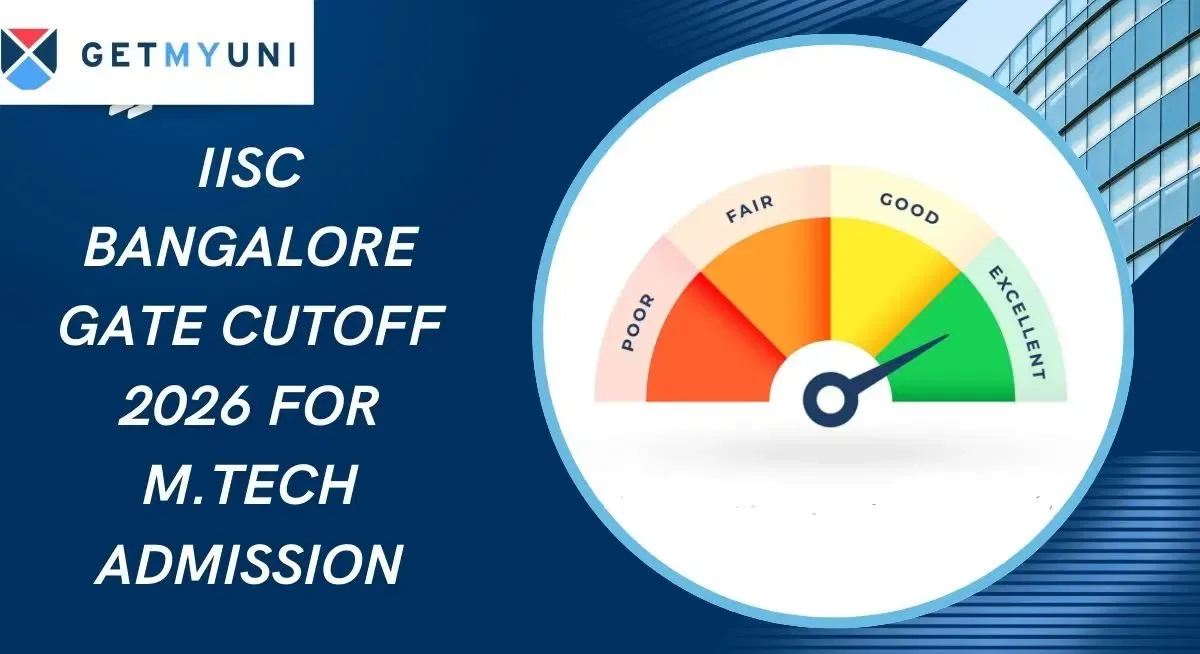GATE CSE marks vs rank vs score analysis for M.Tech admission provides an idea about the college or PSU allocation to the candidates based on their marks or rank or score in the GATE exam. Moreover, they get to know about their performance in the exam.
Table of Contents
- What Do Marks, Rank, and Score Mean?
- Marks vs Rank Analysis for GATE CSE 2026
- Expected GATE Score vs Rank for GATE CSE 2026
- GATE 2026 Marking Scheme
- GATE Score Calculation and Normalization
- Understanding GATE Normalization
- GATE 2025 Rank vs Marks vs Score
- GATE 2024 Rank vs Marks vs Score
- Key Points to Remember for GATE CSE 2026
GATE CSE marks vs rank vs score analysis for M.Tech Admission 2026 is an important step for all students looking to join a good M.Tech college or PSU. The analysis allows the candidates to evaluate their performance and the college or PSU allocation they expect.
It is unwise to directly connect marks, rank, and score with one’s career prospects. By understanding the relationship between GATE marks, rank, and score, it is easier to set expectations about the colleges or PSUs to a more comfortable level.
Computer Science Engineering (CSE) is one of the most popular streams in the GATE exam, making the competition tough amongst the test takers. Below is a detailed version of the GATE CSE marks vs rank vs score analysis for M.Tech admission 2026 to provide an idea to the aspirants about their preparedness and expected allocation.
What Do Marks, Rank, and Score Mean?
The GATE exam uses three parameters to rate every student. Those parameters include marks, rank, and score. Each term has a specific role and meaning:
- Marks: This is the original number that the candidates get in the exam and is generally out of 100. In the situation of multiple-choice questions, the number of correct answers is transformed into marks, considering negative marking.
- Rank: The All India Rank (AIR) is the final list that is calculated based on how the candidates have performed relative to other students. The rank closer to 1 is better compared and contrasted with the other students.
- Score: The GATE score is a score out of 1000 for which the value is normalized over the various sessions, some of which may be easier or harder than others. This score is very important in admission needs and PSU recruitment.
Also Read: GATE Rank Required for PSUs like ONGC, IOCL
More Articles Related to GATE Exam
| GATE Answer Key 2026 | GATE Participating Colleges |
| GATE Cutoff 2026 | GATE Exam Counselling |
Marks vs Rank Analysis for GATE CSE 2026
To give an idea of the possible rank based on the GATE marks, here’s an approximate breakdown of GATE CSE marks vs rank based on past trends:
|
Marks (Out of 100) |
Expected Rank Range |
Remarks |
|
85+ |
1-10 |
Top-tier performance, typically securing admissions to IIT Bombay, IIT Delhi, or IIT Kanpur. Excellent PSU recruitment chances. |
|
75-85 |
10-50 |
Strong performance, securing admission in top IITs, and offering strong PSU recruitment prospects. |
|
65-75 |
50-100 |
Good chance for mid-tier IITs and top NITs. Likely PSU recruitment, though with some competition. |
|
55-65 |
100-500 |
Admission opportunities in newer IITs and good NITs. Lower but still possible chances for PSU recruitment. |
|
45-55 |
500-1000 |
Likely to secure admission to newer NITs, IIITs, or state universities. Limited PSU opportunities. |
|
40-45 |
1000-2000 |
Possible admissions to newer NITs, private institutions, or state universities. |
|
35-40 |
2000-5000 |
Limited opportunities in state universities or private institutions. |
|
30-35 |
5000-10000 |
Very limited options for admission to reputed institutions, mainly state or private colleges. |
|
Below 30 |
10000+ |
Few admission options, and very limited PSU opportunities. |
Expected GATE Score vs Rank for GATE CSE 2026
Based on previous years’ data, here’s an approximate breakdown of GATE 2026 CSE score vs rank (out of 1000) and their corresponding rank ranges:
|
GATE Score (Out of 1000) |
Expected Rank Range |
Remarks |
|
950-1000 |
1-10 |
Top scores, almost guaranteed admission to IIT Bombay, IIT Delhi, or similar top-tier institutes. Excellent PSU recruitment prospects. |
|
850-950 |
10-50 |
Strong chances of getting into top IITs and PSUs like ONGC, NTPC, etc. |
|
750-850 |
50-100 |
Likely admission to top NITs and middle-tier IITs. PSU recruitment is possible but competitive. |
|
650-750 |
100-500 |
Admission to middle-tier IITs and top NITs (NIT Trichy, Warangal). Lower chances for PSU recruitment. |
|
550-650 |
500-1000 |
Admission to newer IITs and decent NITs. Limited chances for PSU recruitment. |
|
450-550 |
1000-2000 |
Possible admission to newer NITs, state universities, and private institutions. |
|
400-450 |
2000-5000 |
Good chances for state universities and private institutions, but limited PSU prospects. |
|
Below 400 |
5000+ |
Mostly restricted to private or lesser-known institutions, with very limited PSU recruitment chances. |
GATE 2026 Marking Scheme
For detailed insight into how the marks are calculated, the scheme for marking is below. GATE CSE includes both the Multiple Choice Questions (MCQ) section and the Numerical Answer Type (NAT) section. Here’s the breakdown:
Marking Scheme for MCQs:
- 1-mark MCQs: Each correct answer earns 1 mark, and for each wrong answer, 1/3 of a mark is deducted.
- 2-mark MCQs: Each correct answer attracts an addition of 2 marks, while for every wrong answer, 2/3 mark is subtracted.
Marketing scheme for NAT Questions:
- Each NAT question is of 1 or 2 marks of weightage.
- The current nature of incorporating NAT questions does not attract any form of negative marking, unlike other forms of assessment questions hence making them more secure for any given candidate.
Also Read: Pursue M.Tech at IIT or PSU Job After GATE? Which is Better?
GATE Score Calculation and Normalization
GATE employs a normalization process to account for variations in difficulty across different sessions. Here’s the formula used for GATE score calculation:
S=Sq+(St−Sq)×M−MqMt−MqS = S_q + (S_t - S_q) times frac{M - M_q}{M_t - M_q}S=Sq+(St−Sq)×Mt−MqM−Mq
Where:
- S = GATE score (out of 1000)
- S_q = Qualifying score for your category
- S_t = Score corresponding to the top 0.1% of candidates in your subject
- M = Marks obtained by the candidate (out of 100)
- M_q = Minimum marks required to qualify for GATE
- M_t = Marks corresponding to the highest marks in your session
This formula ensures fairness across multiple sessions of the GATE exam by adjusting for differences in difficulty.
Also Read: GATE Score Validity 2026 for IITs, NITs, Admission, and PSUs
Understanding GATE Normalization
The use of the GATE normalization policy makes it possible for the candidates to be tested under equal conditions, even though different exam sessions may have different difficulty levels. Normalization is very important in multi-session papers like GATE CSE where the exam is typically taken in different shifts. It goes a long way in explaining the differential difficulty between these sessions as well as assigning corresponding ranks.
Also Read: GATE Negative Marking 2026
GATE 2025 Rank vs Marks vs Score
The GATE 2025 rank vs marks vs score has been added in the table below table
| Rank | Marks (out of 100) | Normalized Score (out of 1000) |
|---|---|---|
| 1 | 91.29 | 975 |
| 2 | 89.38 | 975 |
| 3 | 88.70 | 968 |
| 4 | 88.36 | 964 |
| 5 | 88.02 | 961 |
| 9 | 87.35 | 954 |
GATE 2024 Rank vs Marks vs Score
To provide further clarity, here’s the reference from GATErank vs marks vs score 2024:
|
Rank |
Marks (Out of 100) |
GATE Score (Out of 1000) |
|
1 |
83.33 |
1000 |
|
2 |
83.00 |
1000 |
|
4 |
79.67 |
1000 |
|
6 |
78.33 |
985 |
|
7 |
78.00 |
981 |
Key Points to Remember for GATE CSE 2026
The following are some key points to keep in mind during the GATE 2026 CSE preparation:
- Aim for 65+ Marks: To get into the list of 500 and increase chances of joining IITs or NITs, it is important to prepare for scoring more than 65 marks.
- Normalization Matters: Normalization is a very important factor in terms of percentage points for multi-session papers like CSE. It is recommended to be ready for challenging as well as easier ones.
- Balance MCQs and NATs: Maintaining this balance is key for maintaining a good GATE rank.
Also Read: Preferred M.Tech Alternatives Other Than the GATE Entrance Exam
GATE CSE 2026 (Computer Science Engineering) Exam plays a pivotal role for young engineers, more so for those who want to pursue M.Tech in IITs or going to join Public Sector Undertakings (PSUs). The relationship between marks, rank, and scores can assist eventual candidates in outlining proper study approaches and requirements to meet.























POST YOUR COMMENT